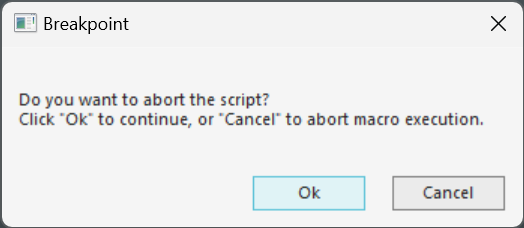Miscellaneous Functions
Breakpoint procedure
Allows to interrupt the execution of a script. While its major use is internal at DAVID while implementing new script commands, the Breakpoint procedure can be handy during development of a script because it lets the user decide whether to continue or abort the script.
Synopsis
Breakpoint("Do you want to abort the script?")Parameters
Name | Type | Required? | Description |
|---|---|---|---|
| string | no | The message that is displayed |
Returns
This function doesn’t return a value.
Remarks
With the call from the “Synopsis” section, the user sees this message box:

DebugOut procedure
Prints a string to the debug console if DBM is currently running under a debugger.
Synopsis
DebugOut("My message; parameter value is %par_value")Parameters
Name | Type | Required? | Description |
|---|---|---|---|
message | string | yes | The string to write. Embedded variables are replaced by their values. |
Returns
DebugOut doesn't return a value.
Remarks
Variables can be embedded in the message parameter and will be resolved before the string is printed. Undefined variables resolve into an empty string. To include a variable, use the $varname or %varname syntax, or optionally, ${varname} or %{varname}. The curly braces notation helps to avoid ambiguities, like "%v0" which results in the content of the v0 local variable vs. "%{v}0" which results in the content of the v local variable, followed by a zero.
DllCall function
Calls a function that is defined in a separate DLL file.
The function must strictly follow these rules. Failure to do so will result in undefined behaviour, including malfunction and crash. Unfortunately, DBM has no chance to verify that the rules are followed, so DllCall should only be used when you have run out of other options!
The DLL is pure unmanaged code, e.g. written in C or C++ (but not C++/CLI or C#).
The function takes exactly one argument; this argument is a pointer to a zero-terminated UCS-2 string (C/C++ type
LPCWSTR).The function returns a zero-terminated UCS-2 string. The memory for this string is allocated by the function through a call to
GlobalAlloc. The actual return value is aHGLOBAL. DBM callsGlobalFreeto release the memory.If the function doesn’t return a value, it should return
NULL.
Synopsis
%function_result = DllCall("C:\path\to\dll\MyDll.dll", "DllFunction", "parameter")Parameters
Name | Type | Required? | Description |
|---|---|---|---|
| string | yes | The full path to the DLL file (see “Remarks”) |
| string | yes | The name of the function |
| any | yes | The parameter for the function |
Returns
DllCall returns whatever the called function returns.
Remarks
The
pathparameter should specify an absolute file path. Relative paths may work, but their use is discouraged because a relative path introduces a source of errors that are not easy to track down.pathmust include the name and extension of the DLL file.Depending on how you create the DLL, the
functionparameter may require an additional leading underscore.functionis the name which the DLL exports.If
parameteris a number, it is converted into a string.The DLL file is not unloaded after execution because odds are high that it will soon be used again; this DBM saves the overhead and execution time of repeatedly unloading and loading the file. To release the file, you must close DBM.
GetCurrentUser function
Returns information about the currently logged-in user.
Synopsis
%user_info = GetCurrentUser()Parameters
(none)
Returns
A JSON object with the fields “name”, “long_name”, and “full_name”. If no user is logged in, all three fields contain empty strings.
GetProcessId function
Returns the Windows process ID of the DBM process.
Synopsis
%pid = GetProcessId()Parameters
(none)
Returns
The process ID as a number.
Login/Logon procedures
Logs a user into DBM. Both commands are synonymous to each other. If a user is already logged in, they are logged off before logging in the new user.
Synopsis
Login(MyUser, MyPassword)Parameters
Name | Type | Required | Description |
|---|---|---|---|
| string | yes | The user’s name |
| string | yes | The user’s password |
Returns
The procedure doesn’t return a value.
Logout/Logoff procedures
Logs a user out of DBM. Both commands are synonymous to each other. No-op if no user is logged in.
Synopsis
Logout()Parameters
(none)
Returns
The procedure doesn’t return anything.
makeguid function
CReates a GUID (“globally unique identifier”).
Synopsis
%guid = makeguid()Parameters
(none)
Returns
A string that represents a GUID.
MessageBox function
Displays a short message on the screen ad waits for the user to click a button.
Synopsis
%reply = MessageBox("This will do something", "Confirm", MB_OKCANCEL)
if (%reply == "IDOK") { ... }Parameters
Name | Type | Required? | Description |
|---|---|---|---|
| string | yes | The message text. |
| string | no | The title displayed in the message box. If unspecified or empty, the title is “Database Manager”. |
| string | no | The message box type (see below). Defaults to |
Message box types
Type | Descrption |
|---|---|
| .The message box contains an “OK” button |
| The message box contains an “OK” button and a “Cancel” button. |
| The message box contains a “Yes” button and a “No” button. |
Returns
The return value is a string that describes the button which the user clicked:
Button | Return Value |
|---|---|
OK |
|
Cancel |
|
Yes |
|
No |
|
Shutdown procedure
Closes DBM and finishes its current session.
Synopsis
Shutdown(silent)Parameters
Name | Type | Required? | Description |
|---|---|---|---|
| string | no | If specified as “silent” (in any combination of upper and lower case), DBM skips all confirmations before closing down. |
Returns
This function does not return.
varexist function
Synopsis
%exists = varexist($var1, %var2, ...)Parameters
Any number of parameters are accepted, but each parameter must be a reference to a local or global variable; expressions are not allowed.
Returns
If each parameter is the name of a variable that exists and is visible within the current variable scope, then
varexistreturns 1.Otherwise returns 0.
